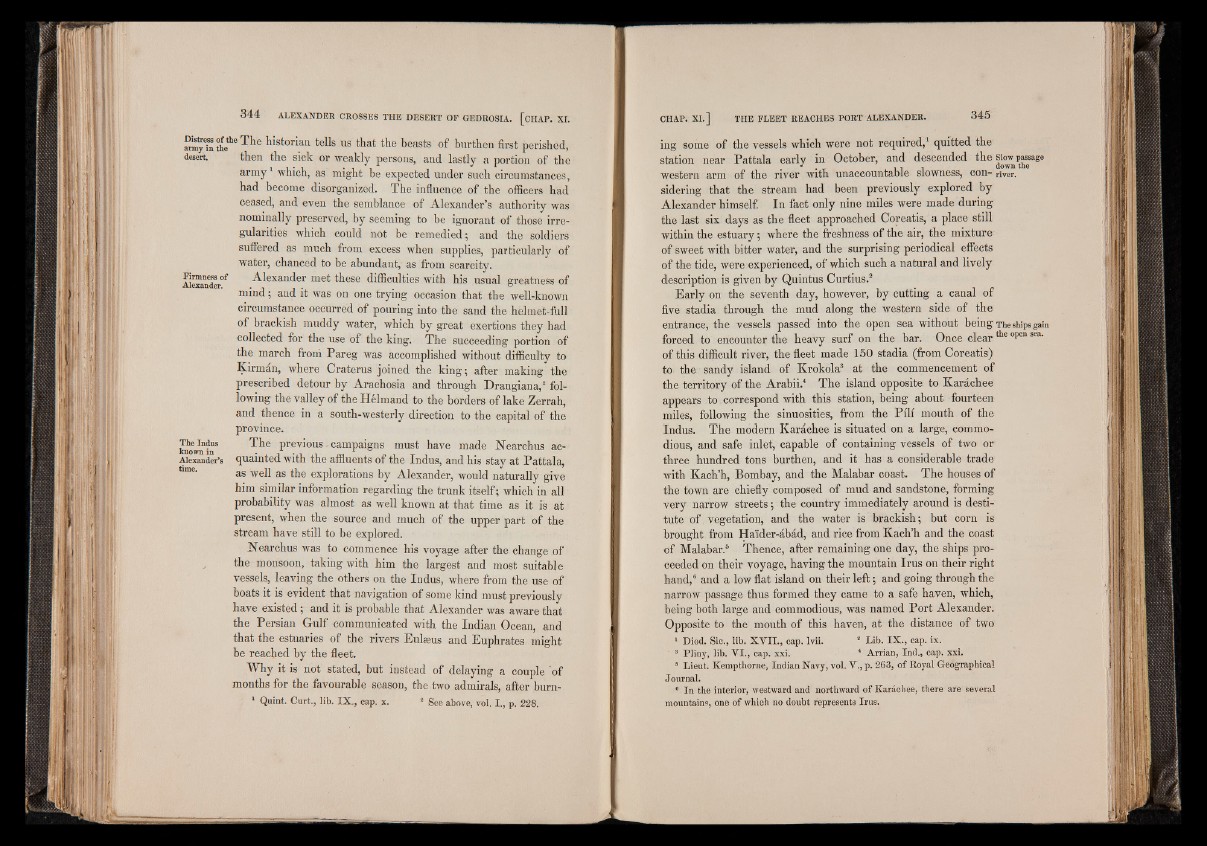
S m y ta tte t h e T h e h i s t o r i a n t e l l s u s that the beasts of burthen first perished,
desert. then the sick or weakly persons, and lastly a portion of the
army1 which, as might be expected under such circumstances,
had become disorganized. The influence of the officers had
ceased, and even the semblance of Alexander’s authority was
nominally preserved, by seeming to be ignorant of those irregularities
which could not be remedied; and the soldiers
suffered as much from excess when supplies, particularly of
water, chanced to be abundant, as from scarcity.
Ai™ander°f Alexander met these difficulties with his usual greatness of
mind; and it was on one trying occasion that the well-known
circumstance occurred of pouring into the sand the helmet-full
of brackish muddy water, which by great exertions they had
collected for the use of the king. The succeeding portion of
the march from Pareg was accomplished without difficulty to
Kirman, where Craterus joined the king; after making the
prescribed detour by Arachosia and through Drangiana,2 following
the valley of the Helmand to the borders of lake Zerrah,
and thence in a south-westerly direction to the capital of the
province.
The Indus The previous - campaigns must have made Nearchus ac-
Aiexander’s quainted with the affluents of the Indus, and his stay at Pattala,
as well as the explorations by Alexander, would naturally give
him similar information regarding the trunk itself; which in all
probability was almost as well known at that time as it is at
present, when the source and much of the upper part of the
stream have still to be explored.
Nearchus was to commence his voyage after the change of
the monsoon, taking with him the largest and most suitable
vessels, leaving the others on the Indus, where from the use of
boats it is evident that navigation of some kind must previously
have existed; and it is probable that Alexander was aware that
the Persian Gulf communicated with the Indian Ocean, and
that the estuaries of the rivers Eulseus and Euphrates might
be reached by the fleet.
Why it is not stated, but instead of delaying a couple of
months for the favourable season, the two admirals, after burn-
1 Quint. Curt., lib. IX ., cap. x. 2 See above, vol. I., p. 228.
ing some of the vessels which were not required,1 quitted the
station near Pattala early in October, and descended J . i i i i the dsloowwn pthasesage
western arm of the river with unaccountable slowness, con- river,
sidering that the stream had been previously explored by
Alexander himself. In fact only nine miles were made during
the last six days as the fleet approached Coreatis, a place still
within the estuary; where the freshness of the air, the mixture
of sweet with bitter water, and the surprising periodical effects
of the tide, were experienced, of which such a natural and lively
description is given by Quintus Curtius.2
Early on the seventh day, however, by cutting a canal of
five stadia through the mud along the western side of the
entrance, the vessels passed into the open sea without being The ships gain
forced to encounter the heavy surf on the bar. Once clearthe open sea'
of this difficult river, the fleet made 150 stadia (from Coreatis)
to the sandy island of Krokola3 at the commencement of
the territory of the Arabii.4 The island opposite to Karachee
appears to correspond with this station, being about fourteen
miles, following the sinuosities, from the Pili mouth of the
Indus. The modern Karachee is situated on a large, commodious,
and safe inlet, capable of containing vessels of two or
three hundred tons burthen, and it has a considerable trade
with Kach’h, Bombay, and the Malabar coast. The houses of
the town are chiefly composed of mud and sandstone, forming
very narrow streets; the country immediately around is destitute
o f. vegetation, and the water is brackish; but corn is
brought from Ha'ider-abad, and rice from Kach’h and the coast
of Malabar.6 Thence, after remaining one day, the ships proceeded
on their voyage, having the mountain Irus on their right
hand,6 and a low flat island on their left; and going through the
narrow passage thus formed they came to a. safe haven, which,
being both large and commodious, was named Port Alexander.
Opposite to the mouth of this haven, at the distance of two
1 Diod. Sic., lib. X V II., cap. lvii. ! Lib. IX ., cap. ix.
3 Pliny, lib. V I., cap. xxi. 4 Arrian, Ind., cap. xxi.
8 Lieut. Kempthorne, Indian Navy, vol. V., p. 263, of Royal Geographical
Journal.
6 In the interior, westward and northward of Karachee, there are several
mountains, one of which no doubt represents Irus.